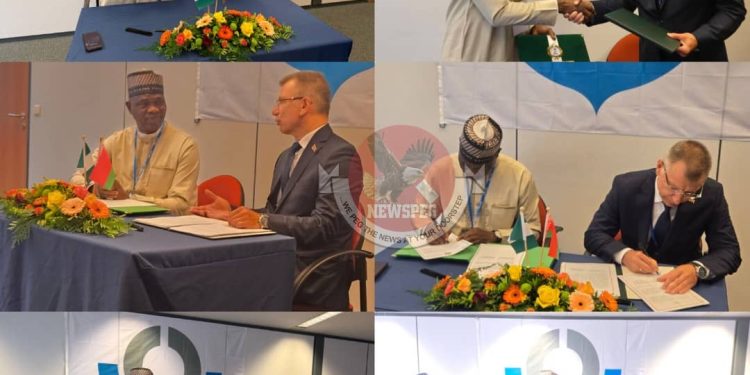By Nkechi Eze
In a landmark move to boost international cooperation, the Nigeria Customs Service (NCS) has deepened its global enforcement strategy with the signing of a bilateral Memorandum of Understanding (MoU) on Cooperation and Mutual Assistance in Customs Matters with the Republic of Belarus. The agreement, which aims to strengthen administrative collaboration, information exchange, and joint operational frameworks, was signed on Friday, 27th June 2025, during the ongoing 145th/146th Sessions of the Customs Co-operation Council at the World Customs Organisation (WCO) Headquarters in Brussels, Belgium.
The historic MoU was signed by the Comptroller-General of Customs (CGC), Bashir Adewale Adeniyi, and the Chairman of the State Customs Committee of Belarus, Mr. Vladimir Orlovsky. The signing ceremony, held as a key sideline engagement at the WCO global summit, symbolises a significant diplomatic milestone in Nigeria’s expanding customs modernization efforts and international trade facilitation strategy.
Speaking shortly after the official signing, CGC Adeniyi described the agreement as a strategic step toward repositioning the NCS as a globally connected, intelligence-driven, and enforcement-ready institution. “We are forging a new chapter in international cooperation, one rooted in mutual trust, operational efficiency, and proactive intelligence,” he said. “This partnership with Belarus strengthens our ability to combat transnational threats, facilitate secure trade, and modernise procedures in line with global best practices.”
The Comptroller-General noted that the agreement is not merely ceremonial, but a legally binding framework for real-time customs collaboration between the two nations. It encompasses a wide range of focus areas including revenue protection, accurate classification and valuation of goods, implementation of import and export restrictions, and the execution of joint enforcement actions against smuggling, customs fraud, and other cross-border crimes.
The MoU, structured in accordance with key international instruments such as the 1961 Single Convention on Narcotic Drugs, the 1971 Convention on Psychotropic Substances, the Convention on International Trade in Endangered Species (CITES), and the 1953 WCO Recommendation on Mutual Administrative Assistance, is expected to deliver significant capacity-building benefits to both customs administrations.
CGC Adeniyi emphasized that the pact aligns with the NCS’s long-term reform agenda, which seeks to adopt an intelligence-led enforcement model, foster seamless trade processes, and bolster Nigeria’s stature as a hub for compliant and innovative customs practices across the African continent. “Beyond enforcement, this is a framework for learning, innovation, and solidarity among customs administrations,” he stated. “Nigeria is proud to stand alongside Belarus in advancing collaborative customs solutions that protect our borders and promote legitimate commerce.”
On his part, Chairman Vladimir Orlovsky expressed appreciation for the visionary leadership of the Nigeria Customs Service and commended Nigeria’s proactive stance on fostering international partnerships. He highlighted the MoU as the foundation for a sustainable relationship between both administrations that will support global trade security and enforcement. “This MoU establishes the foundation for strategic engagement between our administrations. Our shared values in safeguarding trade and combating illicit activity will be the bedrock of this relationship,” he said.
The newly signed agreement outlines a robust cooperation framework covering several critical areas of modern customs administration. These include joint investigations and operations, technical training and capacity development, exchange of customs officials and experts, sharing of risk information and intelligence, and harmonisation of control procedures within the bounds of each country’s national laws.
Officials from both sides indicated that implementation modalities will soon be developed to facilitate timely execution of priority actions under the MoU. According to insiders, operational task teams may be constituted to coordinate efforts on narcotics interdiction, wildlife protection, and data integrity in international trade documentation.
The signing of the MoU comes at a time when global customs systems are confronting increasingly complex threats, including illicit financial flows, trafficking in prohibited goods, under-invoicing, and cyber-enabled customs fraud. The NCS leadership has consistently emphasized the importance of strategic international alliances to tackle these evolving challenges.
With this new partnership, the Nigeria Customs Service continues its active engagement with global stakeholders through the WCO and bilateral platforms, reinforcing its role not just as a national agency but as an international partner in trade security, revenue protection, and institutional resilience. The partnership with Belarus adds to Nigeria’s growing list of customs cooperation agreements and affirms its readiness to be a collaborative player in the global customs community.
















